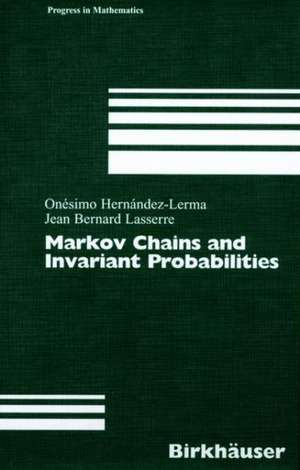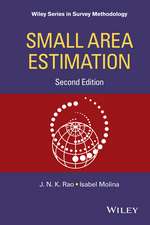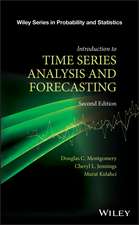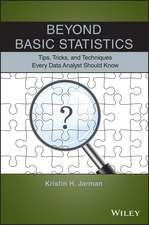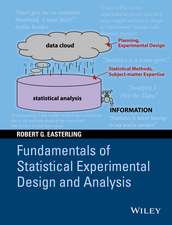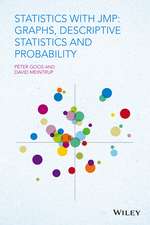Markov Chains and Invariant Probabilities: Progress in Mathematics, cartea 211
Autor Onésimo Hernández-Lerma, Jean B. Lasserreen Limba Engleză Paperback – 23 oct 2012
| Toate formatele și edițiile | Preț | Express |
|---|---|---|
| Paperback (1) | 384.31 lei 6-8 săpt. | |
| Birkhäuser Basel – 23 oct 2012 | 384.31 lei 6-8 săpt. | |
| Hardback (1) | 391.61 lei 6-8 săpt. | |
| Birkhäuser Basel – 24 feb 2003 | 391.61 lei 6-8 săpt. |
Din seria Progress in Mathematics
- 24%
 Preț: 740.79 lei
Preț: 740.79 lei -
 Preț: 308.20 lei
Preț: 308.20 lei - 20%
 Preț: 695.88 lei
Preț: 695.88 lei -
 Preț: 362.51 lei
Preț: 362.51 lei -
 Preț: 308.13 lei
Preț: 308.13 lei - 18%
 Preț: 749.27 lei
Preț: 749.27 lei - 9%
 Preț: 766.41 lei
Preț: 766.41 lei - 20%
 Preț: 631.08 lei
Preț: 631.08 lei - 24%
 Preț: 638.86 lei
Preț: 638.86 lei - 15%
 Preț: 580.82 lei
Preț: 580.82 lei -
 Preț: 392.37 lei
Preț: 392.37 lei -
 Preț: 395.09 lei
Preț: 395.09 lei -
 Preț: 376.80 lei
Preț: 376.80 lei -
 Preț: 390.25 lei
Preț: 390.25 lei - 18%
 Preț: 729.53 lei
Preț: 729.53 lei - 15%
 Preț: 652.49 lei
Preț: 652.49 lei - 15%
 Preț: 649.22 lei
Preț: 649.22 lei - 18%
 Preț: 897.95 lei
Preț: 897.95 lei -
 Preț: 385.08 lei
Preț: 385.08 lei -
 Preț: 391.02 lei
Preț: 391.02 lei -
 Preț: 378.54 lei
Preț: 378.54 lei - 15%
 Preț: 531.59 lei
Preț: 531.59 lei - 15%
 Preț: 642.83 lei
Preț: 642.83 lei - 15%
 Preț: 650.69 lei
Preț: 650.69 lei -
 Preț: 381.21 lei
Preț: 381.21 lei -
 Preț: 392.37 lei
Preț: 392.37 lei -
 Preț: 398.53 lei
Preț: 398.53 lei - 15%
 Preț: 699.28 lei
Preț: 699.28 lei -
 Preț: 416.92 lei
Preț: 416.92 lei -
 Preț: 385.84 lei
Preț: 385.84 lei - 18%
 Preț: 902.65 lei
Preț: 902.65 lei - 18%
 Preț: 802.28 lei
Preț: 802.28 lei - 15%
 Preț: 640.06 lei
Preț: 640.06 lei - 18%
 Preț: 1129.83 lei
Preț: 1129.83 lei - 15%
 Preț: 494.03 lei
Preț: 494.03 lei - 15%
 Preț: 593.08 lei
Preț: 593.08 lei
Preț: 384.31 lei
Nou
Puncte Express: 576
Preț estimativ în valută:
73.54€ • 76.97$ • 61.21£
73.54€ • 76.97$ • 61.21£
Carte tipărită la comandă
Livrare economică 31 martie-14 aprilie
Preluare comenzi: 021 569.72.76
Specificații
ISBN-13: 9783034894081
ISBN-10: 3034894082
Pagini: 228
Ilustrații: XVI, 208 p.
Dimensiuni: 155 x 235 x 12 mm
Greutate: 0.33 kg
Ediția:Softcover reprint of the original 1st ed. 2003
Editura: Birkhäuser Basel
Colecția Birkhäuser
Seria Progress in Mathematics
Locul publicării:Basel, Switzerland
ISBN-10: 3034894082
Pagini: 228
Ilustrații: XVI, 208 p.
Dimensiuni: 155 x 235 x 12 mm
Greutate: 0.33 kg
Ediția:Softcover reprint of the original 1st ed. 2003
Editura: Birkhäuser Basel
Colecția Birkhäuser
Seria Progress in Mathematics
Locul publicării:Basel, Switzerland
Public țintă
ResearchCuprins
1 Preliminaries.- 1.1 Introduction.- 1.2 Measures and Functions.- 1.3 Weak Topologies.- 1.4 Convergence of Measures.- 1.5 Complements.- 1.6 Notes.- I Markov Chains and Ergodicity.- 2 Markov Chains and Ergodic Theorems.- 3 Countable Markov Chains.- 4 Harris Markov Chains.- 5 Markov Chains in Metric Spaces.- 6 Classification of Markov Chains via Occupation Measures.- II Further Ergodicity Properties.- 7 Feller Markov Chains.- 8 The Poisson Equation.- 9 Strong and Uniform Ergodicity.- III Existence and Approximation of Invariant Probability Measures.- 10 Existence of Invariant Probability Measures.- 11 Existence and Uniqueness of Fixed Points for Markov Operators.- 12 Approximation Procedures for Invariant Probability Measures.
Recenzii
"It should be stressed that an important part of the results presented is due to the authors. . . . In the reviewer's opinion, this is an elegant and most welcome addition to the rich literature of Markov processes."
--MathSciNet
--MathSciNet
Textul de pe ultima copertă
This book concerns discrete-time homogeneous Markov chains that admit an invariant probability measure. The main objective is to give a systematic, self-contained presentation on some key issues about the ergodic behavior of that class of Markov chains. These issues include, in particular, the various types of convergence of expected and pathwise occupation measures, and ergodic decompositions of the state space. Some of the results presented appear for the first time in book form. A distinguishing feature of the book is the emphasis on the role of expected occupation measures to study the long-run behavior of Markov chains on uncountable spaces.
The intended audience are graduate students and researchers in theoretical and applied probability, operations research, engineering and economics.
The intended audience are graduate students and researchers in theoretical and applied probability, operations research, engineering and economics.
Caracteristici
Some of the results presented appear for the first time in book form Emphasis on the role of expected occupation measures to study the long-run behavior of Markov chains on uncountable spaces
